Finn McCool
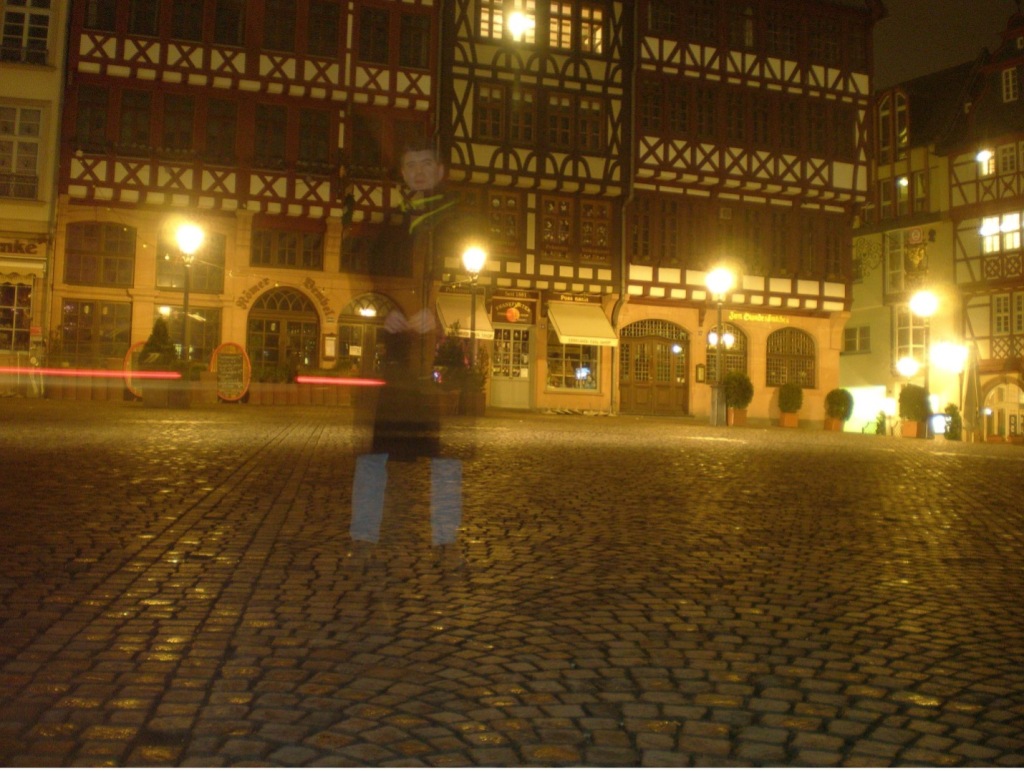
Do you remember all the hubbub and brouhaha surrounding 2012? All the buzz and the excitement? As a Delian, I’m sure you remember. What a time! Wait, what? You don’t know what a Delian is? Okay no, a Delian is not like a Romulan, Klingon, or any other Star Trek alien. And 2012? You don’t remember about that either? Oh, you never even heard about it. Sigh. Oh well. To be honest, I kind of figured, but I was sort of hoping to be proven wrong.
For the uninitiated (I guess that’s you, my friend!), a Delian is a fan of the music of composer Frederick Delius (1862-1934). What!!??? You’ve never heard of Frederick Delius? Sheesh. All right, I’m not gonna lose it or anything. I promise to keep it cool and whatever, I guess. Anyway, where was I? Right, I was about to lose it because no one has heard of Frederick Delius! It’s hard being a Delian! No respect, I tell you.
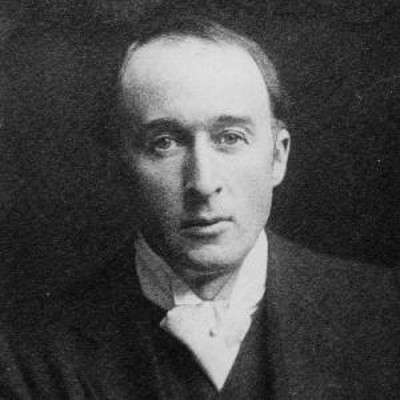
If I’m being completely honest, the man did not do himself any favors, as far as trying to be memorable. For starters, Delius is not really linked with any one country or musical style. You will see him listed (if you bother to look him up) as an English composer. It’s true he was born in England, but his parents were German. He lived most of his life outside England. He studied in Germany, lived and worked in Paris, Florida, and Virginia and finally settled in the French countryside. He had a fondness for Norway and regularly visited, hanging out with his friends Edvard Munch and Edvard Grieg. Delius is sometimes called an “impressionist” composer, but that only captures part of his approach. He was a big fan of Wagner, so you can hear that sometimes in his music, but his harmonies and sonorities can be mysterious and highly personal and his music doesn’t really sound like anybody else’s. I guess that’s what made me a Delian – I appreciated his iconoclastic streak. And when 2012 (the 150th anniversary of Delius’ birth, okay?) rolled around, I went hog wild. I’m exaggerating. All I did really was make plans to go to some events and performances.
As you might imagine, there were Delius events and performances in Virginia, Florida, and Germany to mark the occasion. In January of 2012, I started the year-long celebration off right by traveling to Saint Petersburg to hear the Florida Orchestra perform the Delius compositions Sea Drift and Appalachia. The performances were recorded and released on the Naxos label. If you listen closely, you can hear me sitting there and not saying anything, unlike some audience members, who had to be shushed by Maestro Stefan Sanderling and reminded that WE’RE TRYING TO MAKE A RECORDING HERE PEOPLE!
In February of 2012, I made it out to a performance of Delius’ fourth opera “A Village Romeo and Juliet” in Karlsruhe, Germany. I had never been to Germany and I had never heard of Karlsruhe. I did some research and planned to do some sightseeing in the area. Karlsruhe is a delightful city founded in 1715 in the Baden area and arrayed around the central palace, the Karlsruhe Schloss. When I arrived in Karlsruhe, I mixed up the addresses of the hotel and the theater and went to the theater by accident instead of the hotel. It had started to snow by that point. I finally made it to my hotel, although not without further difficulties. My rolling bag developed a bum wheel, which made it hard to pull through the snow. I inquired at the front desk if I could borrow a knife in order to attempt to fix the wheel. Using my German phrasebook, the best I could manage was, “Do you have a knife? I need to perform surgery on my luggage.”
I had a nice dinner that night of beef rouladen and a local wine, Spätburgunder, which I found out later is the same thing as Pinot Noir. Normally, I am not a fan of Pinot Noir, but maybe because I didn’t know any better, I was able to circumvent my built-in prejudices and enjoy the wine for what it was instead of complaining about what it wasn’t. While planning my trip to Germany, I had stopped off at my favorite wine bar in Bethesda, Maryland, The Grapeseed (RIP!), to get some pointers on local wines to try while I was in Karlsruhe. My favorite bartender, Laura, looked at me quizzically and said she needed to talk to the manager. The manager came out with a big book, like a Wine Atlas or something, with maps and whatnot. He looked for wines to recommend from the area around Karlsruhe and he kind of came up empty. Somebody should have told him (and the authors of the book!) about the Spätburgunder! It’s from the Baden area! Next, I hit a local karaoke joint called Singesong and had a Hoffer Pilsener and Paulaner Weissbier. I got to sing some songs, but only two other people showed up, so we all left after an hour or two. Then I stopped by Mark Platz for a Schassenweider Pilsener. It was all right, but it just reinforced for me that I am not really a fan of the pilsener style.
Ambling around such an old town, it was easy to get transported back in time. Even at the hotel, I was transported back in time – to the 1970s and early 80s! The music they had playing at the hotel seemed to originate almost entirely from that era. I heard “Him” by Rupert Holmes, Cliff Richard’s “We Don’t Talk,” “All Right, I Think We’re Gonna Make It” by Christopher Cross, “I Was Made for Lovin’ You” by Kiss (during breakfast!) and a German version of the Bellamy Brothers’ 1976 hit “Let Your Love Flow.” That last song, called “Ein Bett im Kornfeld” in German, was by Juergen Drews. It was almost a complete replica of the original, except the German lyrics ended up being about sleeping in a cornfield instead of letting your love flow. Interestingly, both the Bellamy Brothers version and the Jurgen Drews version hit #1 in Germany in 1976. I agree that it is a great song. I could listen to it in any language!
The next day, I enjoyed touring the Schloss Museum and seeing the exhibits about what it was like living in the Black Forest area all those years ago. I ate at nearby Multi Kulti, a lunch of penne pasta and shrimp, washed down with a weissen beer (sorry, I did not get the name of the beer!). After lunch, I came back to the hotel for a quick shower and change of clothes before heading out to the opera. “A Village Romeo and Juliet” is probably Delius’ most famous opera and is built upon the short story “Romeo und Julia auf dem Dorfe” by Swiss author Gottfried Keller. Naturally, it also echoes the classic Shakespeare play. In this version of the story, the starstruck lovers are Sali and Vreli, whose parents are warring over a contested strip of land that lies between their two properties. The land actually belongs to itinerant musician The Dark Fiddler, but because he is illegitimate, he cannot claim it. The Dark Fiddler shows up a couple times during the opera, usually to deliver a prophecy or a warning.
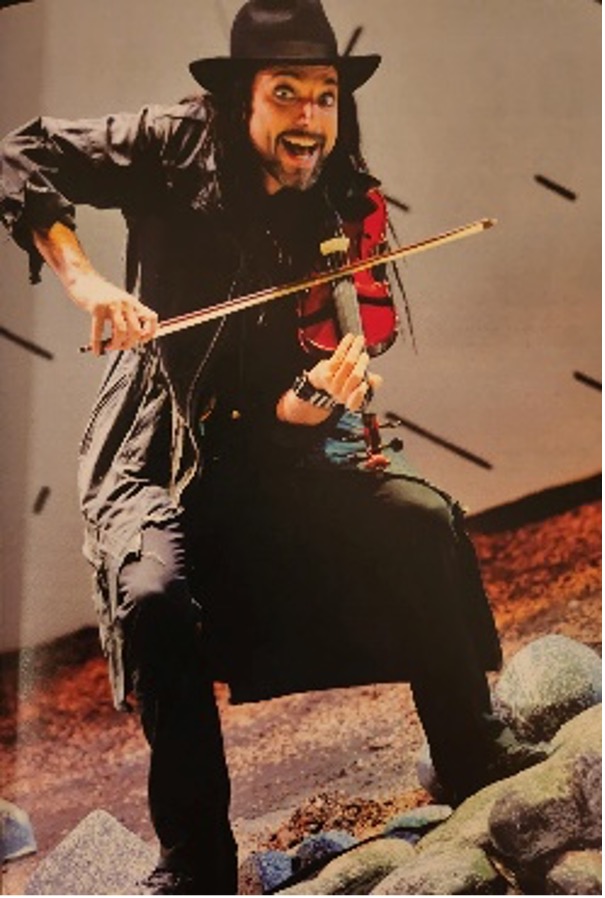
The young lovers decide to elope after Sali inadvertently injures Vreli’s father severely. The pair have the same dream about getting married and resolve to visit a local fair together to buy rings. Here, in Scene 4, is where they realize that they have to be together.
Sali and Vreli feel like they don’t fit in with the vagabonds either and end up deciding to die together. In the production I saw, the dream scene and the fair scene were both very evocative and dreamlike, matching the music. The whole production took place on a revolving stage and the final scene, after they both drown themselves (sorry, spoiler alert!) was very affecting when the stage came back around to show two pairs of empty shoes.
People at the fair give them strange looks and they get creeped out and leave. They run into The Dark Fiddler at The Paradise Garden tavern and he suggests that the young lovers join his group of vagabonds and live the vagabond life. “The Walk to the Paradise Garden” is one of Delius’ most famous pieces and has been performed widely (unlike the opera it comes from!). Here is a performance of a chamber music version of the piece performed by The IBIS Chamber Music Society. I helped the group connect with The Delius Trust to secure a grant to make the chamber arrangement and I also kicked in a donation myself in order to make this happen. You can see me in the second row of the audience in the striped shirt!
My first Delius opera! I was looking around the theater after the performance and I could tell others were affected too. I had dinner at the wine bar across the street and a couple at a nearby table saw my program and asked how I liked the performance. They had been there too! We chatted a little across the aisle and they mentioned that there were some opera singers at another table and suggested I go over to talk to them. Well, why not? It turned out that the five opera singers at the nearby table were not part of the performance I had just seen, but were getting together on a night off. A conductor also stopped by and he had seen the Delius production and liked it. One thing about opera singers is that they are all familiar with multiple languages and many times can speak multiple languages. A lively group! We stayed up drinking until 2:00 a.m.
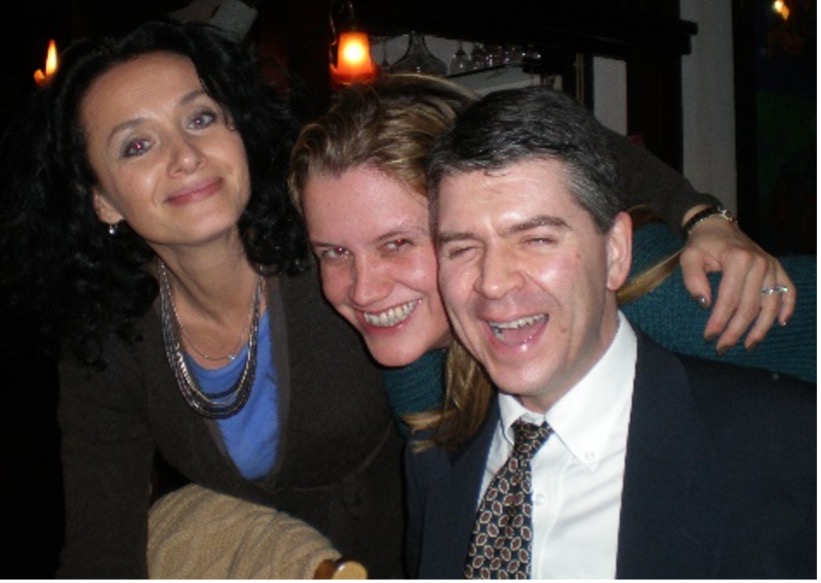
The next day, my notes from the trip say, I set out for Stuttgart at the crack o’ noon. I had a ticket for a football match between Stuttgart and Hertha Berlin. The game was a fun, lopsided affair, with Stuttgart triumphing 5-0! I also witnessed my first hat trick! It was pretty cold all afternoon, even though we were sitting in the sun for the first half. Weather reports indicated negative Celsius temperatures, so it was probably in the 20s in Fahrenheit. I had seen at other football grounds where the opposing fans were sequestered in their own section to avoid any interactions with the home fans, but this was the first time I had seen the opposing fans literally trapped in a cage. I guess that’s a guarantee that there will be no interactions with the home fans! After the match, I headed to Second Hand Records as the sun went down and it got colder and colder. I kept ducking into shops to warm up! When I got there, the store was closed, so I headed to a restaurant on my list, but I couldn’t find it! I ended up having a slice of raspberry pie and three cups of awesome Assam tea at a dessert café before heading back to Karlsruhe for the night. The train was a local and took an hour and a half to get back to the main Karlsruhe station. Then I added an hour onto that by getting turned around, disoriented and finally on the wrong train to neighboring Etlinger town. I was looking for Etlinger Strause in Karlsruhe, so I went way out of my way. Two guys walking a dog took pity on me and called a cab for me.
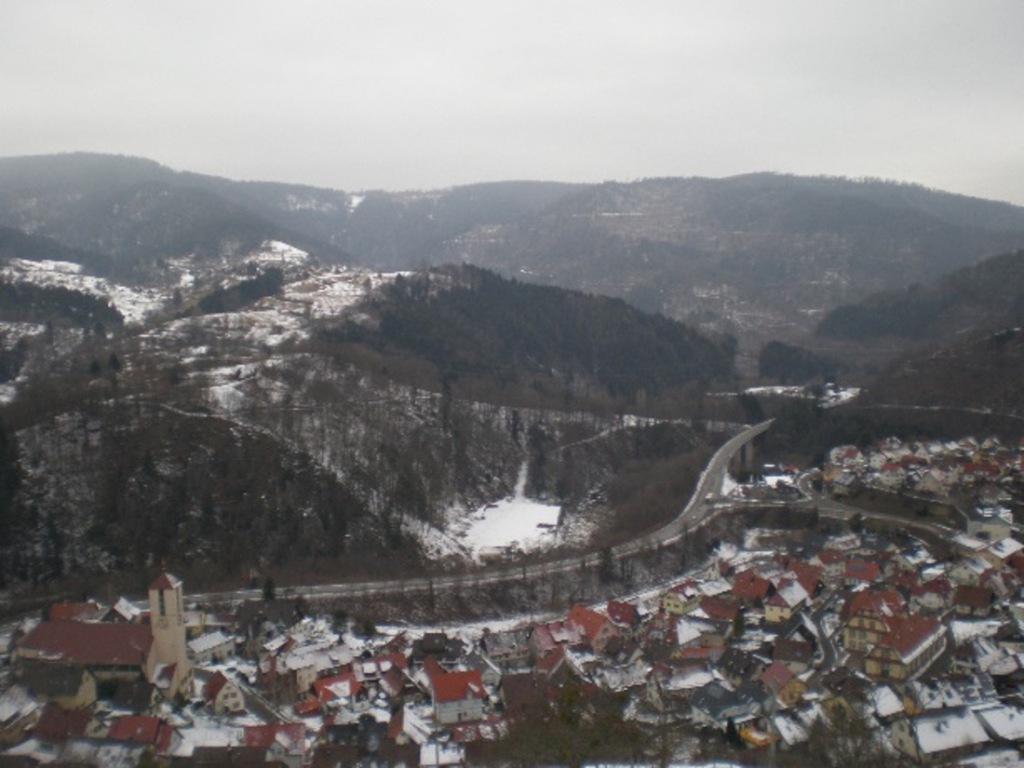
The next day, I took the train to Forbach, in the Black Forest. I arrived a little after 2:00 p.m., but I could not get into my hotel until 4:00 p.m., so I spent the time relaxing and dozing in a café and eating a pretzel shaped like a mouse.
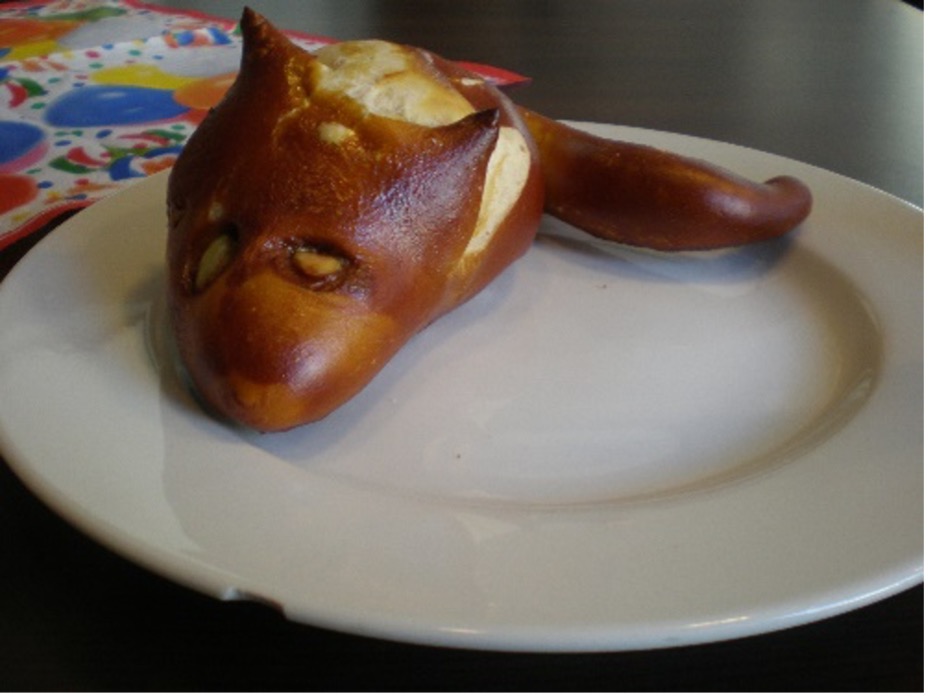
The proprietor and a guest helped me sort out what was going on and called the hotel for me. I was going to book another hotel! When I finally got to my hotel (again), which is actually 200 yards down the road in Gausbach, I had a dinner which I couldn’t finish and then I collapsed in the room, exhausted at around 7:00 p.m.
The following day, I set out to do some hiking in the Black Forest! I started off the day with a bloody nose. Maybe from the altitude? My energy level was low, but I managed to get in about three hours of hiking. No really good vistas though. The trees were great, though. Everywhere you looked!
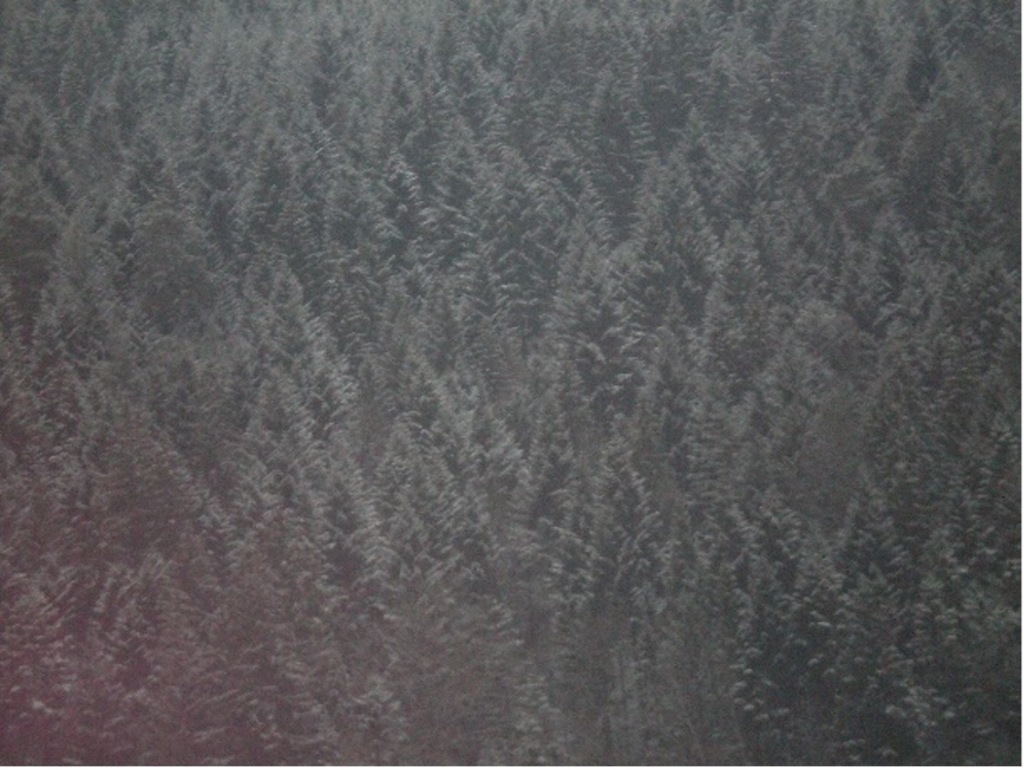
Back at the hotel room, I watched the Eurovision early round for Germany as well as a strange variety show with frumpy people, tacky costumes and hokey music! So much fun! I also listened to a French radio station playing this odd whistling-trumpet-drunken-vocal song called “Ulysee” by the French-Algerian singer Ridan. Loopy and a bit psychedelic. I like it!
I was psyched to do some more hiking in The Black Forest, so I set out for the tourist office the next day to get directions to the lake for a nice hike. I confirmed with the driver that the bus was going to the lake. I was the only passenger and yet he did not stop at that stop. He kept on going until the end of the run and then turned off the motor and sat there. I asked him where the trail was and then I guess he realized he had driven past it. He drove me down the hill and showed me where the trail head was. He said I could take the trail to the next bus stop. The trail was pretty nice and secluded, but it was only a 30-40 minute hike! The next bus at that stop was 35 minutes away, so I tried to find another trail head, but to no avail. I went back to the bus stop and waited. The next bus only went to Brühl, which was even farther west than I already was (which was too far west), but it did have a connection to get me back to Forbach. Once I got to Brühl, I had to wait 30 minutes for a bus ride that lasted 40 minutes. By the time I got back to Forbach, it was 4:30 p.m. and only a limited amount of time left to hike, so I did a power hike until 6:00 p.m. Then back at the hotel, I had dinner and a sauna!
Before bed, I listened to some more radio and caught this great free/composed jazz/classical piece by New Zealand saxophonist Hayden Chisholm. I had a devil of a time tracking down the music after I got home, but I ended up ordering a copy of “Mute Density: Live with the Lucerne Jazz Orchestra” direct from Chisholm himself. It was part of a 13-CD (!) set called “13 Views of the Heart’s Cargo”, but he sold me the single disc separately. After following up with him on the delay in shipping, he explained that he had just moved and sent me an autographed copy of the disc. Nice! But what I really liked was the music itself. I had a hard time figuring out what was improvised and what was composed. They used to call classical/jazz fusion “Third Stream Music” and I think this is a great example of what that type of music could be. I had never really found any Third Stream that I could latch onto, despite liking the concept. Here’s a video of Hayden Chisholm with the Lucerne Jazz Orchestra from a later concert. I know they’re playing from music stands, but it’s still not always clear to me what is composed and what isn’t!
I also heard an interesting program which juxtaposed The Beatles’ Indian-inspired “Within You Without You” with Indian-inspired music by the German group Embryo, recorded live with the Karnataka College of Percussion in 1979.
Embryo has been called a Krautrock group, which is a term that doesn’t do a whole lot for me, outside of letting me know that the group is from Germany. I was familiar with the Krautrock groups Magma, Faust and Can, but Embryo seemed to be a little more tilted toward the jazz side of things, alongside some world music influences. Embryo has been around in one form or another since the late 60s and appears to be continuing to this day. So there is a lot to investigate!
Next stop on the whistle tour: Frankfurt!
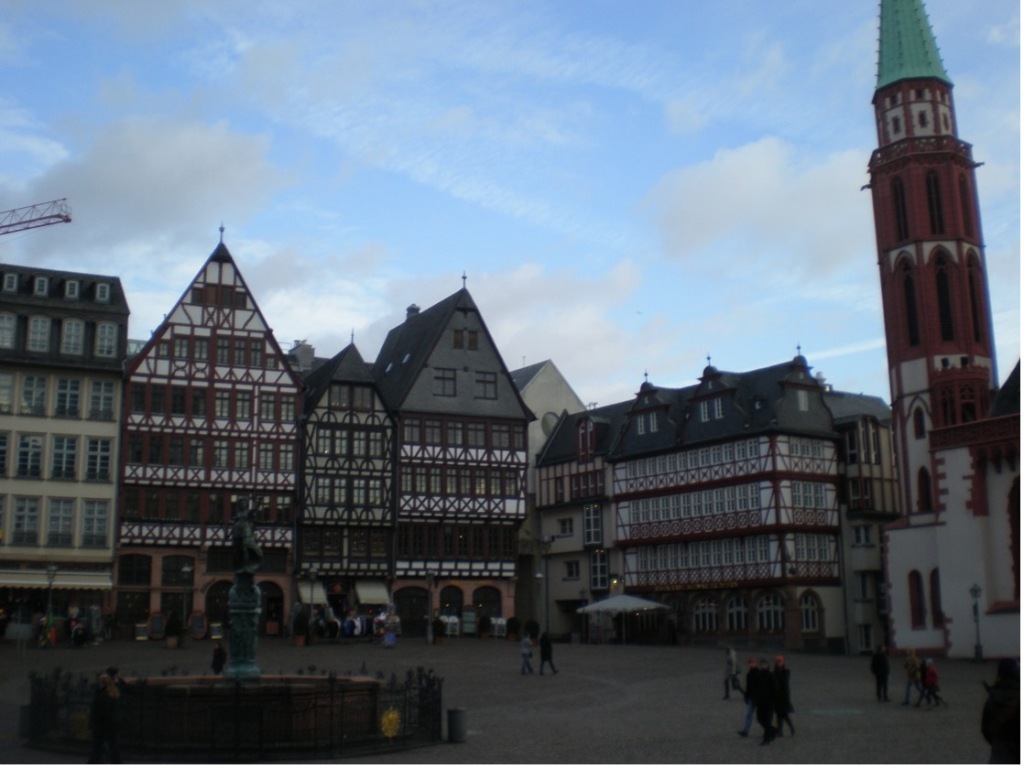
I went to see the Edvard Munch exhibit at the Schirn Kunsthalle in Frankfurt. It was an entertaining exhibit, but did not mention his friendship with Frederick Delius and no “Scream”. I wanted to scream! I was able to stop by Sick Wreckords to check out their selection of obscure psych and Krautrock, but it was all expensive reissues. Then I found the apfelwein tavern mentioned in my guidebook. The guidebook stated that apfelwein was an acquired taste (fermented apple cider made from sour apples like Granny Smith) and I found that it was not a taste that appealed to me. I had two glasses, just to make sure. I also stopped by Curry Wurst for a bite to eat. Curry Wurst, as you might imagine, specializes in German-style sausages in curry sauce. They had a chart on the wall showing you how hot the sauce can get, from one to ten. I asked for the heat in my order to be “vier” or level four. There must have been some miscommunication because the guy behind the counter presented me with four orders instead of one order of level-four heat!
On the radio, I heard this rollicking sing-along:
Research has revealed that the song, “Fahrende Musikanten” by Nina und Mike, is a Schlager song. I had no prior experience with Schlager music, so all I have to go on is this song and the various descriptions that I have read. Most descriptions are derogatory, to be honest. Schlager tends to be described as hokey, tacky and frankly downright embarrassing. Well, I’m not ready to dismiss an entire genre of music out of hand so quickly. I can’t deny how catchy this song is. I now think that the show I saw on TV at the hotel was a Schlager music show. And it was so much fun! I think everybody has room for the occasional Spätburgunder in the musical diet!
The Delius Anniversary year ended for me in October of 2012. I was in the process of making plans to hit the Delius Festival in Danville, Virginia, when I was invited to a wedding, which I ended up attending instead of the Delius Festival. The woman who invited me to the wedding was the woman I ended up marrying, so I feel like I made the right choice. No offense, Fritz (Delius’ friends called him Fritz), but the choice wasn’t close!
